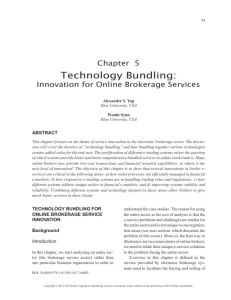Join getAbstract to access the summary!

Join getAbstract to access the summary!
Alexander Y. Yap and Wonhi Synn
Technology Bundling
Innovation for Online Brokerage Services
IGI Global, 2012
What's inside?
How e-brokers can raise their service value to even higher levels.
Recommendation
Professors Alexander Y. Yap and Wonhi Synn of North Carolina’s Elon University analyzed online brokerage services the fun way: They opened accounts and started trading. They believed their in-the-trenches experience would enable them to assess e-trading services and recommend innovations these firms need to make to be competitive. They traded securities for a year, while exchanging views with other users and checking relevant message boards. The study starts on solid, informative ground when the researchers describe the e-brokers’ capabilities and value to clients, but ventures onto thin ice with limited data and anecdotal evidence about judging system breakdowns and their possible prevention. Readers should be aware that their research dates from 2004 to 2006, and the paper might have benefited from more rigorous editing. Still, getAbstract suggests the report to those interested in learning more about how e-trading works.
Summary
About the Authors
Alexander Y. Yap is an associate professor of information systems at Elon University in North Carolina, where Wonhi Synn is a finance professor. He is also the head of the finance department.
















Comment on this summary